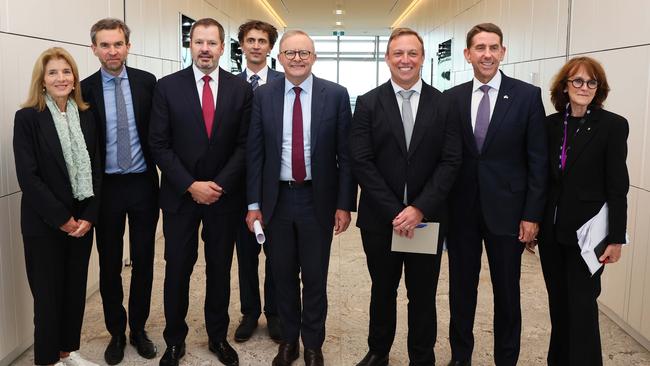Anthony Albanese’s $940m quantum bet on tech that ‘doesn’t work yet’
US-based PsiQuantum has acknowledged the technology for a world-first, fault-tolerant quantum computer in Brisbane ‘doesn’t work yet’ but remains confident it will be operational by 2027.

You can now listen to The Australian's articles. Give us your feedback.
US-based company PsiQuantum has acknowledged the technology required to build a large-scale, fault-tolerant quantum computer in Brisbane “doesn’t work yet” but remains confident its world-first project will be operational by the end of 2027.
The Weekend Australian can reveal PsiQuantum’s $940m Future Made in Australia funding from the Albanese and Miles Labor governments is tied to strict milestones and reporting requirements, with Australian taxpayers officially becoming “shareholders” in the Silicon Valley firm’s next capital round.
The Albanese government’s bet on PsiQuantum consists of an equity investment of $189.5m, with the remainder of the $470m comprising debt. The Queensland government has a similar arrangement, with a conditional $200m construction and term debt facility, and conditional $75m economic development and credit support facility.
PsiQuantum, which has attracted billions of dollars in public and private investment over the past 12 months and has significant backing from US and British government agencies, is locked in a global race to build the first fault-tolerant quantum computer.
The tech company is competing with Chinese firms and US corporate giants including Google, IBM, Microsoft, Intel and Amazon, some of which have allocated significant funding and resources to unlock quantum computing over the past two decades.
PsiQuantum co-founder and chief scientific officer, Pete Shadbolt, said that although the bulk of the computer would be made in Australia, componentry that could not be developed locally would be built offshore, including advanced chips by GlobalFoundries in New York.
Amid criticism that the government’s significant backing of PsiQuantum could stall work by local quantum pioneers, Dr Shadbolt said the company would work closely with Australian-based academics and firms. PsiQuantum, which has signed agreements with five Queensland universities, recently inked a deal to open a lab at Griffith University. Dr Shadbolt said the California-based company, which employs more than 300 staff, planned to have computer components “in that lab in Griffith and hopefully also elsewhere, getting tested, getting validated, getting debugged”.


“Quantum computing is a new technology. We’re trying to usher it into reality. It doesn’t work yet. I think it’s just overall, extremely exciting that there’s serious backing for getting it done,” Dr Shadbolt said.
“The plan is to have that (Brisbane) site operational by the end of 2027. And then build successively larger systems. We have a very ambitious plan to build this machine. We have the Australian taxpayer as a shareholder in our company, and our responsibility first and foremost is to get on with it, build the thing, get it done, and then go and build a bigger one and a bigger one in Australia and continue to compound on that advantage.”
Ahead of PsiQuantum breaking ground next year at its government-facilitated site near Brisbane Airport, the company has pledged to recruit 400 permanent skilled domestic workers by 2032 and collaborate with experts and firms based in Australia.
The PsiQuantum deal announced by Anthony Albanese before the May budget has been criticised by the Coalition over concerns about secretive government procurement processes, domestic quantum firms losing out and whether the start-up can deliver the hi-tech computer as promised. The Weekend Australian understands the Albanese government views the PsiQuantum deal as potentially its most significant legacy, with the processing power of a quantum computer promising medical, artificial intelligence and climate change breakthroughs.
PsiQuantum, whose Australian chief executive and co-founder Jeremy O’Brien has pioneered major advancements in photonic qubits (quantum bits), has pledged to build a quantum computer requiring significant qubit counts and stable error correction. While some companies operate small quantum computers, PsiQuantum is developing scaled-up systems with qubit counts of up to one million.
Dr Shadbolt said “bringing to life” a large-scale quantum computer would require significant support from universities, Defence, governments and skilled workforces. “I think there’s an easy misconception that we’re going to build the machine in California, put it on a boat, sail it over to Brisbane, and turn it on and it’s going to work – and of course, nothing could be further from the truth,” he said. “This is something where we’re going to have a site development activity outside the airport that will take years before that site is ready to go.”
The experimental physicist, who was in Canberra this week providing progress updates, said the commonwealth and Queensland governments were “shareholders in the company … and they have oversight”.
“There’s (funding) milestones and regular updates,” Dr Shadbolt said. “So far, a lot of the work has been paperwork. And you can imagine that going from that announcement to actually putting shovels in the ground is not a trivial exercise. There’s been a huge amount of activity going on … and we’re on course to get it done.”
US, British, Australian and Canadian governments have accelerated quantum computing funding, amid reports Beijing had spent $15.3bn to give China a competitive advantage.
Dr Shadbolt said while “people love to do the competitive analysis … our job is just to get on with it”.
“If you think about big, successful, hard technology companies, they were successful because they got on with it,” he said. “They achieved a level of technical maturity that the other guys failed to achieve. Like TSMC, SpaceX, ASML … they hold extreme strategic technological power because they executed. They got there, and they’ve continued to compound on their advantage.”
Dr Shadbolt clarified that a recent $US500m ($764m) commitment announced by Illinois Governor J.B. Pritzker for PsiQuantum to build a quantum computer in Chicago by 2028 would not have an impact on the Brisbane deal. PsiQuantum holds multi-year partnerships with the US Defence Advanced Research Projects Agency, Department of Energy and Air Force Research Laboratory.
While the idea of quantum computing is decades old, Dr Shadbolt said PsiQuantum’s focus was unlocking chemistry, physics and mathematics applications that would help transform the world’s energy, pharmaceutical, semiconductor and aerospace industries.
“These all sit on a foundation of molecules, reactions, drug molecules, fertiliser, fuel molecules,” he said. “Chemistry and physics are the foundation of our advanced society. Quantum computers are expected to solve problems that we’ll never solve using any conventional computer that we could ever build. That’s really why we think there is a very lucrative opportunity here, a very transformative opportunity, to push the boundaries of our advanced technology and society.”
Dr Shadbolt said the Brisbane quantum computer would “consume significant power” on par with a medium-sized data centre.
“Building a quantum computer is difficult,” he said. “You need a big machine if you want to have real impact. And by big, I mean about a million qubits relative to the 72 qubits that Google has today. This is not a machine that is spending its time running social media and so on … it’s actually hoped to produce insights into new solar cells, new technologies. If you believe that we need advanced technology to escape from the climate challenges that we have, then a quantum computer, hopefully, is a very powerful tool to help in that fight.”




To join the conversation, please log in. Don't have an account? Register
Join the conversation, you are commenting as Logout